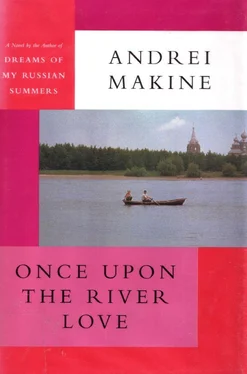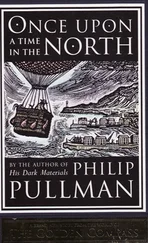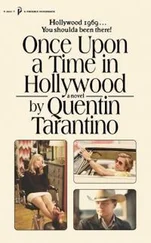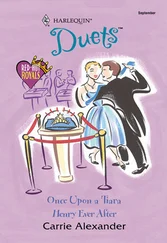Several days later, in the blazing sunlight, the village broke loose from its moorings: the Olyei was on the move, shattering its ice, hurtling southward. Toward the river Amur.
Intoxicated by the luminous freshness of this motion, we were overcome with vertigo. The sky turned upside down in the cascading torrent. Our izbas sailed along amid snows still intact, between the somber walls of the taiga.
We were all three of us there, gazing at the slow slide. Utkin stood a couple of steps behind us. It was the first time after all those years that he had come out to see the breakup…
But here the unleashing of the springtime spate had none of the devastating power of the Amur. Nor was there anything symbolic about it. It was quite simply the disintegration of the river's winter shell. A shell of days, memories, moments, taking itself off toward the south amid the melodious creaking of the ice floes and the lapping of the liberated torrents, bombarded by the sun's rays.
As the slabs of ice floated by, we saw the marks of our snow-shoes and the holes made by our pikes. Then it was the turn of the Devil's Bend, the deep ruts dug in the snow by the wheels of heavy trucks, and the stippling with black oil…
Suddenly there was an unexpected commotion. A broad section of ice near the little izba bathhouse detached itself, slid down onto the shore, and joined the general convoy. Our eyes were riveted to its angular surface. On it one could see distinctly, molded in the snow, the imprints of two naked bodies. These were the ones left by Samurai and myself on the occasion of our last nocturnal bath, two days previously – the marks of our mute ecstasy as we gazed at the starry sky. These two bodies, with their long legs wide open and their outstretched arms, moved off slowly toward the mighty river. Toward the sun of Asia. Toward the Amur…
Throughout that day of the breakup Utkin remained a little distracted and vague. On account of his painful memory of the river, we supposed. But in the evening, when we were sitting on the first slope to be freed of snow, he drew a crumpled sheet of paper from his pocket and announced with a tense smile: "I want to read you a poem!"
"A poem by Pushkin?" I asked mockingly.
Utkin made no reply, lowered his eyes, and began to read. In an uneven, hoarse voice, which seemed as if it no longer belonged to him. At the first Unes I almost let out a whisde. Samurai swiftly stopped me with a cold look.
"I know your vigil underneath this snow Is more despairing far than death… I know if I came close to you I'd simply earn a pitying glance. But I will not approach. I'll stay here in the plain's cold fog To be a presence in white emptiness, A distant figure. So that you can dream Of him who comes eternally to meet you But never arrives. …"
At the last words, Utkin's voice became choked. He thrust the paper into the pocket of his sheepskin coat, got up abruptly, and began running along beside the Olyei, sinking into the soft snow. He looked more than ever like a wounded bird attempting to fly…
We were silent. Samurai took out his cigar and lit it with a slow gesture. He looked pensive. Exhaling the bitter smoke, he raised his eyebrows, gently shaking his head to the rhythm of his silent thoughts. Then, noticing that I was watching the course of his reflections on his face, he clicked his tongue and uttered a sigh.
"You know, women are stupid. For a poem like that they should risk perdition! But they like handsome little guys like you or great hefty ones like me. Look at him… he's running along like a madman. There. He's fallen down, poor fellow!… No, no. We should leave him alone right now…"
Samurai fell silent. In the distance we saw Utkin get up, shake off the snow stuck to his sheepskin, and continue his limping progress toward the first trees of the taiga… Suddenly Samurai smiled and gave me a wink.
"Admit it. He would never have had the courage to read us his poem if we hadn't seen Belmondo! Maybe he wouldn't even have written it…"
We returned to the village by the fluid blue light of the springtime dusk.
"Go and knock on his door," Samurai instructed me. "Tell him they're showing the film for the last time tomorrow. Who knows when we'll ever be able to see it again. Either this one or any others. Maybe not before next winter…"
Next day at six-thirty after the achievements of socialist labor and the distribution of decorations at the Kremlin, we entered a fairy city that arose from the depths of the sea. Venice! And the indomitable Belmondo was racing along at the wheel of a speedboat, cutting himself a path between languid gondolas. In flight from his pursuers, he and his ship of fools hurtled straight into the lobby of a luxury hotel, whose first floor was scarcely higher than the level of the canal. The glass doors were smashed to smithereens, the staff took cover in protected corners. And smiling indulgently, he announced with a grand gesture: "I have reserved the royal suite for tonight."
How many lips there were in the heart of our taiga that spring murmuring the magic word "Venetsia!"
Samurai had got it right: after that showing Belmondo took a vacation. As if, now that it was summer, his presence at the end of Lenin Avenue was less indispensable. And it is true that as the trees cloaked themselves in the verdant shadow of the first leaves, they gradually hid the squat building of the militia and the KGB, and softened the angular contours of the barbed-wire factory.
But more than anything, that West which he had sought to acclimatize on the permafrost of our lands seemed to be taking root. The summer will take care of the rest, he must have thought, as he went off on vacation.
Yes, the Western World now seemed firmly grafted into our hearts. Was it by chance that even the stupid newsreels, showing the gold armor plating of those Kremlin medals and the Sta-khanovite weavers, now inspired a kind of tremor in our breasts? We remembered that back in the winter those weavers and those bemedaled old men used to precede the appearance of our hero. Now they were almost dear to us. And to our amazement, it was behind the masks of these propaganda robots that we discovered the first nostalgia of our lives: nostalgia for those long journeys through the snow-covered taiga, the complex constellations of scents, luminous tones, and sensations…
One summer's evening all three of us were gathered around Olga's samovar, listening to her tale. She was telling us about a writer whose novel she could not read to us, first of all because the book was too long – it would take years to read, she said, and a whole lifetime to understand – but also because it was evidently not translated into Russian… She therefore confined herself to summarizing a single episode, which, she claimed, expressed the idea of it… The hero was, like us, drinking tea, although he did not enjoy the benefits of a samovar. One perfumed sip and a mouthful of a cake with an unknown name produced a miraculous reaction from his taste buds: in him were reborn the sounds, the smells, and the spirit of the distant days of his childhood. Without daring to interrupt Olga's story, or to admit this insight, we asked ourselves, astonished, incredulous: "What if an image seen scores of times – that of the weaver; or the cool smell of shapkas covered in melted snow; or the darkness of the auditorium at the Red October – what if all those could take the place of the young French aesthete's cake? What if we, too, could have access to this mysterious Western nostalgia, with the rudimentary means we have at hand?"
With Belmondo, one miracle more or less was not a problem…
But it was the language of the West, even more than the themes of its novels, that was taking root in us.
Читать дальше












